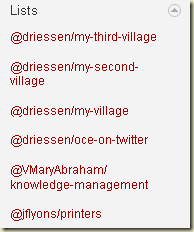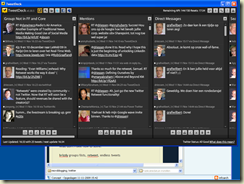What Do Twitter Lists Mean to Me and for Business?

What do Twitter Lists mean? I think it will take a while to find out. Jeremiah Owyang points to recruiting: When hiring see on how many Lists they are mentioned . Debbie Weil calls Lists "the new measure of cool" . Denis Hancock of Wikinomics also relates Lists to popularity, but wonders if popularity relates more to the number of people that follow your lists or the number of lists you're on. And Robert Scoble shares how Lists have changed the way he follows tweets. I'm happy we have lists. One of the reasons people were using Tweetdeck , Brizzly and the like had to do with the fact that Twitter.com had no functionality to group the people you follow. And what these groups meant to us was clear. They were our own private groups in Tweetdeck and Brizzly. Of course there were sites that helped people find tweeps related to certain topics. For instance Wefollow . However in Wefollow you could say which list you wanted to belong too. The amount of followers and


